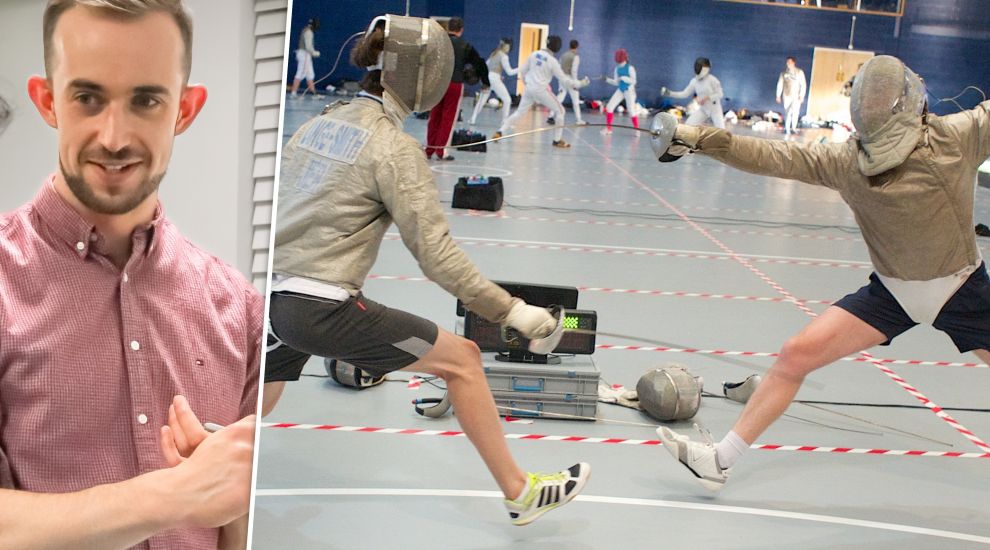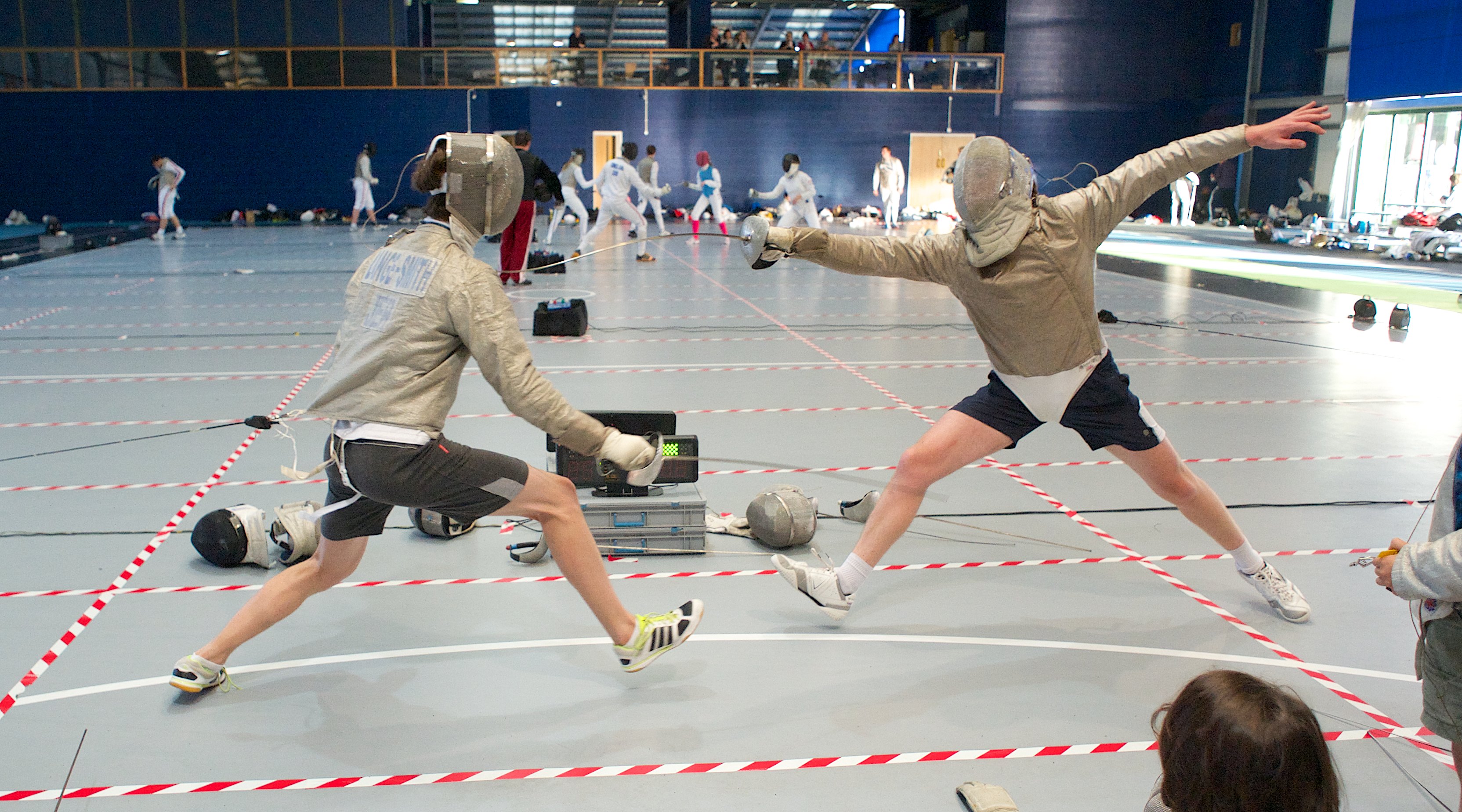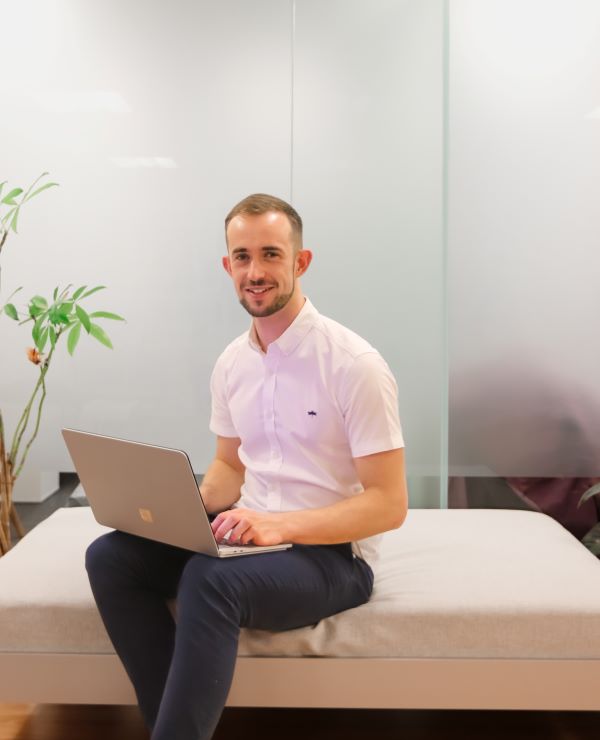

He once represented Jersey in fencing on the international stage – now, he dedicates his time to teaching local athletes how to fine-tune their minds for top exercise and sporting performance.
Simon Lange-Smith – who has previously taken part in the Island Games and supported athletes in this year's edition – founded Strong Minds in 2021 to offer specialist Sport and Exercise Psychology services to islanders.
Sport and exercise have been a constant in Simon’s life. He has been involved in a number of different sports and eventually specialised in fencing, going on to represent Jersey at both Junior and Senior Commonwealth Fencing Championships.
“What intrigued me most were the psychological challenges in sports, especially dealing with competitive pressure,” he explained. “As a result, after studying a degree in psychology I decided to specialise with a Master’s degree in sport and exercise psychology.”

Pictured: Simon has represented the island many times in fencing.
Following his return to the island in 2019, Simon started assisting local athletes through the Jersey Sport Foundation.
Two years later, he founded Strong Minds, which led him to support Team Jersey at the Birmingham 2022 Commonwealth Games, and more recently, athletes at the Guernsey 2023 Island Games.
In addition to his work in Sport and Exercise Psychology, Simon is also involved in the local mental health services in Jersey and pursuing a Professional Doctorate in Sport and Exercise Psychology. Whilst there’s “never a dull moment”, he took some time to answer a few questions about his area of focus.
"Sport and Exercise Psychology is all about the psychology of sports and fitness. In short, it's split into two parts: Sport Psychology and Exercise Psychology. Sport Psychology focuses on the mental aspects of performance and competition in sports, aiming to enhance athletes' self-confidence, motivation, focus, emotional control and communication skills.

Pictured: After a degree in psychology, Simon specialised with a Master’s degree in sport and exercise psychology.
"Exercise Psychology, on the other hand, deals with the psychological side of getting active and healthy, focusing on resolving motivational and emotional barriers to exercise and developing and maintaining healthy habits."
"It was the perfect mix of two things I absolutely love: psychology and movement. It's a field that combines these passions of mine in a way that's really intriguing. What makes it even more exciting is the opportunity it gives me to help people reach their goals and become the best they can be.
"It's all about using what I know to make a positive difference in people's lives and help them grow into their fullest potential."
"Potentially quite a lot! For athletes, it can enhance the psychological characteristics that are essential for success in sport, ultimately leading to improved performance. Exercise Psychology can promote healthy exercise habits and a more positive exercise experience, which we know is hugely beneficial for long-term physical and mental wellbeing.

Pictured: Simon said some of his clients have used the techniques they learned in areas other than sport and exercise, such as job interviews.
"On top of that, in my opinion one of the most important benefits is that people can take the skills and insights that they learn through Sport and Exercise Psychology and apply them in other areas of their lives. For example, I’ve had clients come back and tell me that they’ve used the techniques they learned to manage competition nerves to help handle a job interview, or used communication skills we’ve worked on in their team sport to be more assertive in difficult conversations."
"A common myth is that Sport and Exercise Psychology is only for high-performance athletes. It can be beneficial for anyone seeking to improve their performance or wellbeing. Your psychology is important whether you're a serious athlete, fitness enthusiast, recovering from an injury, dealing with chronic health issues, or just trying to live a healthier life. So, whoever you are, Sport and Exercise Psychology is for you!"
"Applying the principles of Sport and Exercise Psychology can help people's wellbeing in a number of different ways. By addressing mental aspects like stress, anxiety, and self-doubt, individuals can develop healthy coping mechanisms, build resilience, and enjoy a more positive outlook on their sporting pursuits and exercise routines.
View this post on Instagram
"This, in turn, can lead to increased motivation, better overall health, and a more balanced and fulfilling lifestyle."
"Psychological research highlights three core needs for optimal wellbeing and motivation: feeling we know what we’re doing (competence), having meaningful connections (relatedness), and a sense of control (autonomy). These needs are closely linked to exercise challenges. Not knowing where to start (competence) can make us hesitant, while feeling out of place or lacking a workout partner (relatedness) can hinder us.
"Following a rigid plan against our preferences (autonomy) also poses a problem. An exercise psychologist can help address these barriers by enhancing competence, fostering belonging, and aligning choices, ensuring a more successful and satisfying fitness journey. It's like fine-tuning your mind and environment for a fulfilling exercise experience."
This article first featured on Bailiwick Wellbeing, your free weekly guide to wellness in work and island life. Sign up now here so you don't miss the next edition.
Comments
Comments on this story express the views of the commentator only, not Bailiwick Publishing. We are unable to guarantee the accuracy of any of those comments.